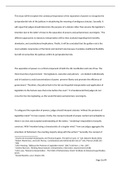This essay will first explore the contextual importance of the separation of powers to recognise the
jurisprudential role of the judiciary in deciphering the meaning of ambiguous statutes. Secondly, it
will argue that judges should determine the purpose of a statute rather than assume the legislator’s
intention due to the latter’s threat to the separation of powers and parliamentary sovereignty. 1 The
different approaches to statutory interpretation will be then analysed regarding their benefits,
drawbacks, and constitutional implications. Finally, it will be concluded that the golden rule is the
most suitable compromise of the literal and mischief rules because it enables conditional flexibility
but still circumscribes the judiciary within its jurisprudential role.
The separation of powers is a critical component of both the UK constitution and rule of law. The
three branches of government - the legislature, executive and judiciary – are divided institutionally
and in function to avoid concentrations of power, preserve liberty and promote the efficiency of
government.2 Therefore, the judicial task is the fair and impartial interpretation and application of
legislation to the factual cases that come before the court. 3 It is fundamental that judges do not
cross the line into legislating, as this would threaten parliamentary sovereignty.
To safeguard the separation of powers, judges should interpret statutes ‘without the pretence of
legislative intent’4 for two reasons. Firstly, the concept is devoid of proper content and unhelpful as
there is no clear and accepted understanding of the notion, 5 rendering it impossible to factually
construct. With ‘intention being a characteristic of a singular mind’, 6 how can judges aggregate the
intentions of Parliament, the enacting majority along with the writers? 7 Secondly, the concept of
1
Charles de Secondat Montesquieu and Thomas Nugent, The Spirit of Laws, (1st edn, Batoche Books 2001).
2
Robert Masterman, and Colin Murray, Constitutional and Administrative law (2nd edn, Pearson 2018) 224.
3
Ibid.
4
John Manning, “Without the Pretense of Legislative Intent” (2017) 130 Harv. L. Rev. 2397.
5
Andrew Burrows, Thinking About Statutes: Interpretation, Interaction, Improvement (2018).
6
John Laws, 'Statutory Interpretation – The Myth of Parliamentary Intent' (Institute of Advanced Legal Studies,
2017).
7
Ronald Dworkin, Law’s Empire 318.
Page 1 of 9
, parliamentary intention is contrary to the separation of powers because it results in a subjective
execution of the interpretive exercise. Judges try to ‘think into the minds of the enacting legislators
and imagine how they would have wanted the statute applied to the case’.8 This encourages the
influence of implicit biases on statutory interpretation, contradicting the judiciary’s jurisprudential
role to provide an impartial and fair adjudication of the law. Therefore, pursuing parliamentary
intention ‘become[s] a mask for judges to hide their true reasoning’ 9 to be actively involved in
shaping social policy and the common law.
To determine statutory purpose, there are three main rules of statutory interpretation: the literal
rule, mischief rule and golden rule. In the absence of ambiguity, the literal rule is used to give the
words of a statute their ordinary meaning, as defined in Sussex Peerage Case.10 Concerning
constitutionalism, this rule successfully restricts the role of the judge and prevents the influence of
prejudices on legislation to uphold parliamentary sovereignty and give an appearance of impartiality.
Despite this ideal, there is often disagreement as to what constitutes the ordinary meaning such as
with the word ‘supply’ in R v Maginnis 11. This causes judges to determine the meaning of a statute
through the infliction of personal views meaning that the literal rule can subsequently act as a mask
for the judiciary to disguise active interpretation with the choice of a narrow or wide interpretation
of the matter, as was the case in Anisminic Ltd v Foreign Compensation Commission. 12 Another
disadvantage of the literal rule includes the creation of loopholes in the law, as demonstrated in
Fisher v Bell13 where the display of a flick-knife in a shop window, contrary to the Offensive Weapon
Act 1959, was held to be an invitation to treat and not an offer to sale. Therefore, literalism is
impractical as the creation of difficult precedents command time to rectify because it fails to address
8
John Manning, “Without the Pretense of Legislative Intent” (2017) 130 Harv. L. Rev. 2397.
9
Andrew Burrows, Thinking About Statutes: Interpretation, Interaction, Improvement (2018).
10
Sussex Peerage Case (1844) 1 Cl & F 85, 86.
11
R v Maginnis (1987) AC 303.
12
Anisminic Ltd v Foreign Compensation Commission (1969) 2 AC 147.
13
Fisher v Bell (1961) QB 394.
Page 2 of 9




